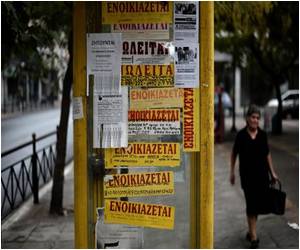Prices in Greece are finally getting trimmed after salaries were hacked back.

"It's about time that prices went down a bit," grumbles Vangelis Mavromatis, a low-income civil servant who commuted some 10 kilometres (six miles) from the port of Piraeus for his haircut.
"Of course, they could drop further," he adds, noting that his own salary has more than halved from 1,500 euros ($2,000) in 2011 to 600 euros.
Greece has been living an economic paradox.
Its economy began a slide into recession in 2008, followed by a fiscal crisis in 2010 that saw the country bailed out but required to implement tough austerity measures.
Not only has the economy contracted by a fifth since the recession began, incomes have fallen by nearly a third under the impact of the spending cuts and tax hikes mandated under the country's EU-IMF loan bailout.
Advertisement
Average annual inflation was 3.1 percent in 2011 and 1.0 percent in 2012.
Advertisement
Prices have since dropped continuously and 2013 closed with a deflationary rate of 0.9 percent.
Nevertheless, there are glaring disparities.
From a basket of twelve popular goods tracked monthly by the state statistics agency, three continued to register price increases in December: alcohol and cigarettes, housing and health.
Heavy taxation provides part of the explanation to why Greece displays some of Europe's highest prices in household goods.
But there are also kinks in competition which years of state effort have failed to crack.
Government probes in the past have found the existence of cartels in milk and fruit, and hints of similar collusion among petrol station operators.
"Fresh pasteurised milk in Greece costs up to 34 percent more than the European median," Development Minister Costis Hatzidakis said in November, as the government presented an OECD-commissioned study on how to improve competition.
"We cannot stay inactive and we will not," he said.
In the study, the OECD said it had found 555 regulatory restrictions in food processing, retail trade, building materials and tourism that were "potentially harmful" to competition.
In 2008, the Hellenic chamber of commerce carried out a European study that showed that Greeks on average were paying 1.4 euros a kilo for flour compared to 0.49 cents to 1.09 euros elsewhere in the bloc.
Six years on, food is still proving resistant to deflation. In December, food prices fell by just 0.8 percent compared to drops of three and four percent elsewhere.
And while many small and medium-sized traders that form the bulk of Greek retail continue to tighten their belts -- in many cases just to survive -- big chains continue to profit, consumer groups say.
"Supermarket chains are not lowering their prices and limit themselves to special offers," says Evangelia Kekelia, secretary general of consumer rights group KEPKA.
An employee at an Athens supermarket who declined to give her name confirms the trend.
"There are price cuts of 5-10 cents on certain products, but we mainly have special offers," she told AFP.
Source-AFP









